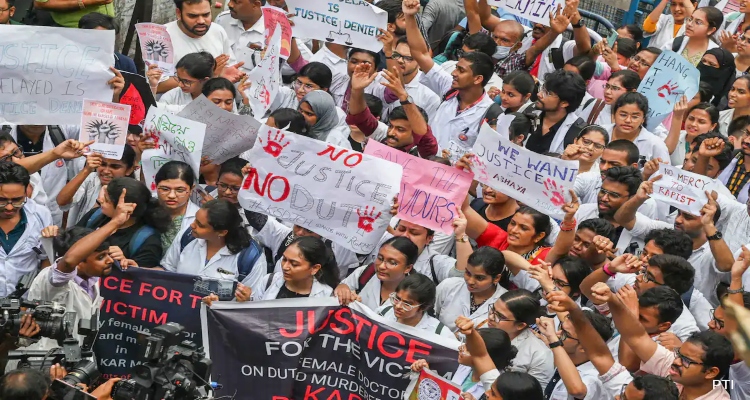
The Calcutta High Court on Friday observed that the mob violence at R. G. Kar Medical College and Hospital represented a significant failure of state machinery. Consequently, the court directed the police and hospital authorities to file affidavits regarding the situation.
A bench of Chief Justice T S Sivagnanam and Justice Jiranmay Bhattacharya expressed disbelief at the state’s assertion that police intelligence was unaware of the gathering of 7,000 people. The court found it difficult to accept that such a large crowd could assemble at the hospital in the early hours of Thursday (August 15) without prior knowledge.
After learning that renovation work was underway on one floor of the hospital following the discovery of a woman doctor’s body—who was allegedly raped and murdered—the Chief Justice indicated that the court could order the closure of the medical establishment.
The division bench directed the police and the hospital administrator to file separate affidavits detailing the “true state of affairs” at the hospital and all related matters on August 21, when the matter will be heard again.
The court, also comprising Justice Hiranmay Bhattacharyya, instructed the police to place on record the entire sequence of events that led to the vandalism at the hospital.
A group of individuals, posing as protesters, entered the hospital, vandalized the emergency department, nursing station, and medicine store, and damaged CCTV cameras.
The mob also ransacked a stage where junior doctors had been demonstrating since August 9. The body of the woman post-graduate trainee, who was allegedly raped and murdered, was found in the seminar hall of RG Kar Hospital on that day.
The CBI was also directed by the court to file an interim report on the progress of its investigation into the “rape and murder” of the medic, which led to a cease-work by junior doctors in various government hospitals across the state, demanding exemplary punishment for the culprits and better security at the workplace.
The court noted that the bench had urged the doctors on August 13 to consider returning to work, reminding them of their “pious obligation” towards patients. However, the vandalism and violence at the hospital on August 15 would inevitably affect the mindset of the protesting doctors.
It further emphasized that doctors working in the hospital must be given adequate protection; otherwise, they will be unable to discharge their duties.
The Additional Solicitor General, appearing for the CBI, stated that a special team set up to investigate the rape and murder case is proceeding with the matter. He also submitted a copy of the FIR lodged by the CBI following the court’s order to transfer the investigation from Kolkata Police to the CBI.
The bench expressed concern about what might happen if a similar incident occurred in another facility in West Bengal.
“If the police are injured and unable to control the mob, then the law and order situation has failed,” the court remarked.
Leader of the Opposition Suvendu Adhikari’s counsel claimed that the attack on the hospital was pre-planned, with people brought in lorries to destroy the crime scene.
The Chief Justice pointed out that the police intelligence wing should have had information about such a large gathering.
“If 7,000 people were to gather, it is very hard to believe that the state police intelligence did not know,” the court observed.
The court described the situation as “an absolute failure of state machinery” and remarked that it was a “sorry state of affairs” if the police force could not protect its own men.
Senior advocate Bikash Ranjan Bhattacharya, appearing for one of the petitioners, informed the court that a portion of the fourth floor, where the seminar hall—where the crime occurred—is located, was demolished on the evening of August 13. The demolition work was halted only after protests by doctors and students.
The state counsel submitted that the crime scene was secure and that renovation work was being carried out by the PWD. He explained that there had been a long-standing demand for a restroom for doctors, and the work was in progress to fulfill that demand.
Questioning the urgency of the renovation work, an exasperated Chief Justice stated that the court could order the closure of the hospital and transfer patients to other government facilities.
“We will convince the patient parties to cooperate, shift everybody, and close the hospital,” he said during the submissions by various parties.
The court stressed the need to ascertain the reason behind the vandalism at the hospital, noting the significant difference between a mob of 35 or 70 people and one of 7,000.
Bhattacharya, representing the victim’s parents, claimed that only about 40 to 80 miscreants were involved in the hospital vandalism.
The court remarked that such incidents are unprecedented in other parts of the country.
The bench reminded that the law prohibits disclosing the identity of such victims and requested that individuals known to the victim and the media refrain from circulating the victim’s photograph, name, or any other identifying information.




